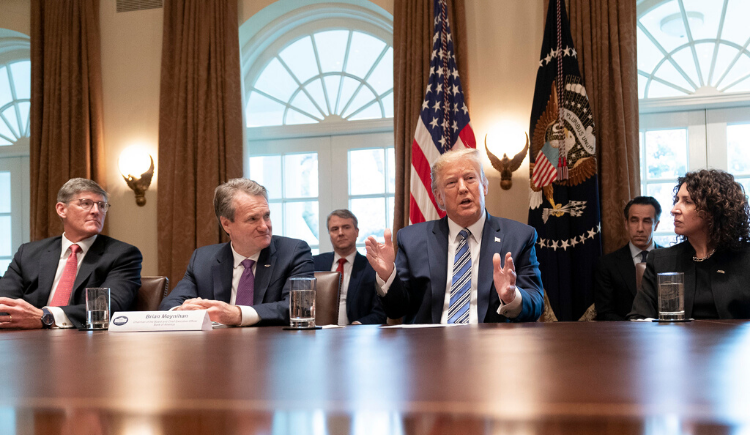The U.S. will add the U.K. and Ireland to travel sweeping restrictions as the coronavirus spreads, President Donald Trump said Saturday, discouraging the broader public from traveling unless necessary.
Trump earlier this week announced that foreigners who have been in 26 European countries over the last two weeks won’t be allowed in to the U.S. for 30 days. Vice President Mike Pence said the rules will take effect midnight Monday.
“We’re using the full power of the federal government to defeat the virus.”
President @realDonaldTrump gives a Coronavirus update: pic.twitter.com/kRjAjLmrUr
— The White House (@WhiteHouse) March 14, 2020
Airlines have scrambled to slash flights as the drastic measures amid the pandemic roils the travel industry.
Speaking at a coronavirus briefing on Saturday, Trump said further travel restrictions, possibly within the United States, from places with high numbers of cases, is possible.
About President Trump’s test
President Trump has been tested for the coronavirus, but said he didn’t know when he’d have the results.
But Trump said he had just had his temperature taken and joked that he’d compare his result with the press in the room – the reporters would not have been allowed in if they’d had an elevated temperature.
As Trump was leaving the briefing room, the reporters asked him what his temperature was.
Trump turned back and said, “Totally normal.”
Trump’s announcement that he’d been tested came as a surprise after days of his reluctance to do so. Over night the White House even released a letter from the president’s doctor saying that he didn’t need to be tested despite his close contact with two infected individuals.
Here are some other significant developments:
- Spain announced an additional 1,500 cases, emerging as a new hot spot with 5,753 cases nationwide, the second highest in Europe.
- Italian Deputy Health Minister Pierpaolo Sileri tested positive for coronavirus on Saturday, as the country remains on a near-total lockdown.
- White House will now check temperature of anyone who interacts with President Trump and Vice President Pence.
- U.S. lawmakers from Florida have self-isolated as the number of people who visited Mar-a-Lago last weekend and later tested positive for the virus climbed to three. The latest is a Brazilian ambassador who sat at President Trump’s table during a dinner.
- England reports 10 new deaths as New York sees its first.
- The Pentagon announced new domestic travel restrictions for service members and their families to help contain the outbreak, saying in a memo that virtually all trips must be put on hold through May 11.
On Friday, a day before Trump added U.K. and Ireland, Delta Air Lines said it would cut capacity over the next few months by 40%, the most in its history as it scrambles to save cash. It also said it would defer some of its ordered aircraft and park up to 300 of its planes. It is freezing hiring and asking employees to take unpaid leave. Other airlines have also made deep flight cuts and similar staffing changes as they try to preserve jobs.
“The speed of the demand fall-off is unlike anything we’ve seen – and we’ve seen a lot in our business,” wrote Delta’s CEO Ed Bastian in a note to employees.
Trump administration officials have repeatedly said they are working with airlines but it is not yet clear what kind of support the government could offer. Some measures, such as waiving ticket taxes or airport fees may be limiting if travel demand falls more steeply or if the Trump administration institutes domestic travel measures, since that money is collected with consumers buy tickets.
“We are in discussions with the White House and Congress regarding the support they can provide to help
us through this period,” Bastian said in his note. “I’m optimistic we will receive their support. That said, the form and value is unpredictable, and we can’t put our company’s future at risk waiting on aid from our government.”
United Airlines CEO Oscar Munoz, who is scheduled to hand over the reins to the company’s president, Scott Kirby in May, said he met with senior Trump administration officials and lawmakers to “understand what government policies they may be considering and explain to them the impact that the coronavirus has had on our business.”

